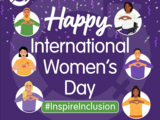March is Women's History Month
As we celebrate Women's History Month and International Women's Day at Retriever Integrated Health, we enter a time of reflection, celebration, and advocacy for the invaluable contributions of women (cis, trans, and feminine presenting individuals) throughout history. This year, the theme "Women Who Advocate for Equity, Diversity, and Inclusion" resonates deeply, highlighting the pivotal role women play in championing these essential values. But amidst our recognition of progress, we must also shine a light on a critical aspect often overlooked: the intersection of women's advocacy with mental health.
The journey towards equity can be arduous, loaded with obstacles and challenges that can take a toll on mental well-being. In the pursuit of gender equality, self-identified women often face discrimination, microaggressions, and systemic barriers that can lead to stress, anxiety, and burnout. The pressure to juggle multiple roles and expectations, whether as students, professionals, caregivers, or activists, can exacerbate these mental health challenges. Moreover, women from marginalized communities experience intersecting forms of discrimination, compounding the impact on their mental well-being.
As we honor the trailblazing women who have paved the way for progress, it's important to reaffirm our commitment to supporting the mental health of all women. Here are a few ways we can integrate mental health into our advocacy efforts during Women's History Month and beyond:
- Promote Self-Care: Encourage women to prioritize self-care practices that nurture their mental and emotional well-being. Whether it's practicing mindfulness, engaging in hobbies, or seeking therapy, self-care is essential for maintaining resilience and balance.
- Amplify Diverse Voices: Ensure that diverse voices are heard and represented in conversations about mental health and women's advocacy. Intersectionality is key to understanding the unique challenges faced by different groups of women and tailoring support accordingly.
- Provide Supportive Spaces: Create inclusive and supportive environments where women feel safe to share their experiences and seek help without fear of judgment or discrimination.
- Educate and Raise Awareness: Foster education and awareness around mental health issues, challenging stereotypes and misconceptions that may prevent women from seeking help. By destigmatizing mental illness and promoting a culture of empathy and understanding, we can create a more inclusive and supportive community for everyone.
Cis, trans, and female presenting individuals can find support on-campus at Retriever Integrated Health and the Women's Center. To access free and confidential counseling services at RIH, please call (410) 455-2542 or use the RetrieverCare portal to schedule an Initial Consultation. Additionally, the Maryland Department of Human Services and the Maryland Commission for Women also has a list of Health and Wellness Online Resources.
Posted: March 8, 2024, 8:42 AM
